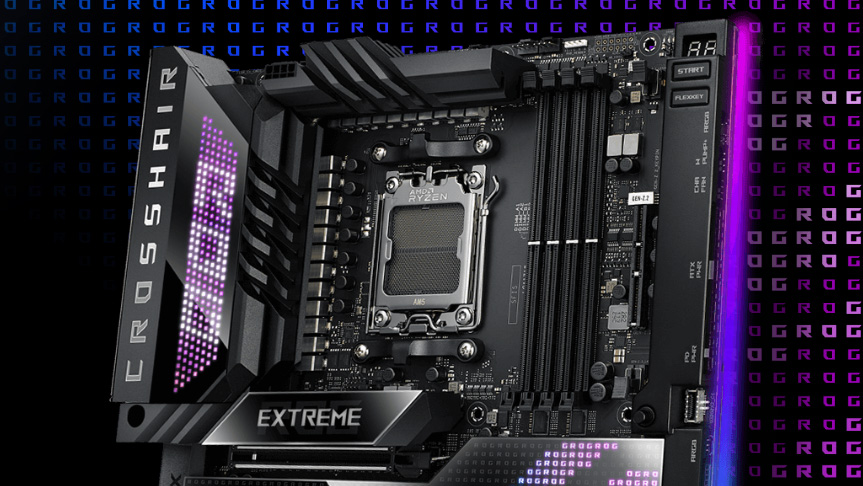Asus adds AMD Ryzen Zen 5 Granite Ridge CPU support for its X670E motherboards
The latest BIOS with the AGESA 1.1.7.0 update hints that Zen 5 is almost upon us

Asus has rolled out new Beta BIOS for its Republic of Gamers (ROG) and Strix X670E motherboards to support the upcoming Zen 5 'Granite Ridge' CPUs. The update also contains the new AGESA 1.1.7.0 update. This BIOS update could indicate the inevitable Zen 5 launch is just a matter of weeks away. Additionally, AMD has switched its AGESA naming scheme from ComboAM5PI to FireRangePi.
Asus has rolled out the new Beta BIOS for seven of its X670E series AMD AM5 Motherboards.
- ROG CROSSHAIR X670E HERO
- ROG CROSSHAIR X670E GENE
- ROG CROSSHAIR X670E EXTREME
- ROG STRIX X670E-A GAMING WIFI
- ROG STRIX X670E-E GAMING WIFI
- ROG STRIX X670E-F GAMING WIFI BETA
- ROG STRIX X670E-I GAMING WIFI BETA
According to other leakers, the upcoming Ryzen 9000 'Granite Ridge' Zen 5 CPUs are expected to arrive by between April and June 2024. We reported about AMD's plans to release multiple Granite Ridge CPUs, including a pair of 170-watt eight-core chips and a six-core 105-watt CPU. It would seem that a whole family of AMD 9000 Series CPUs might be unveiled and potentially ready for retail during Computex 2024.
At the time of writing, other X670E AM5 motherboards from MSI and Gigabyte/ Aorus are yet to receive BIOS updates. But with the new AGESA update ready to be implemented, it shouldn't take too long for respective motherboard manufacturers to roll out updates. Even though the Granite Ridge CPUs are not available to the general public, companies, system integrators, and quite possibly reviewers may already have access to samples.
In November 2023, Dell conveniently revealed its upcoming desktops with AMD 9000 series CPUs. It is likely major PC system builders have already prepared systems and marketing materials in advance so we should be seeing new prebuilt desktops with the Granite Ridge CPUs.
It is highly likely that AMD Zen 5 CPUs are already in mass production and have been for some time. This would make sense as motherboard makers like Asus have already started rolling out BETA BIOS. It is hoped that the upcoming AMD Zen 5 CPUs will have 10 to 15% IPC over Zen 4 variants without 3D Vertical Cache while providing higher DDR5-6400 memory compatibility.
Get Tom's Hardware's best news and in-depth reviews, straight to your inbox.

Roshan Ashraf Shaikh has been in the Indian PC hardware community since the early 2000s and has been building PCs, contributing to many Indian tech forums, & blogs. He operated Hardware BBQ for 11 years and wrote news for eTeknix & TweakTown before joining Tom's Hardware team. Besides tech, he is interested in fighting games, movies, anime, and mechanical watches.
-
Reply
The update also contains the new AGESA 1.1.7.0 update. This BIOS update could indicate the inevitable Zen 5 launch is just a matter of weeks away. According to other leakers, the upcoming Ryzen 9000 'Granite Ridge' Zen 5 CPUs are expected to arrive by between April and June 2024.
Nope.
It is highly unlikely we are getting new ZEN 5 CPUs in a matter of weeks. They will first announce/unveil the new lineup around Computex 2024 event. And then give it a few more months time of release window/Q3, give or take. AMD has done this in the past as well.
Who are these 'other' leakers, btw ? They don't have a clue about what they are talking. How can the chips arrive in April/May, when the announcement is expected to be in June 2024, lol ?
We can expect to get the first official unveiling of this Zen 5 "Granite Ridge" CPU family during Computex 2024 in early June. But nothing is set in stone yet. Of course, they can release some of the flagship Zen 5 chips during computex as well, but we can't say for sure.
We reported about AMD's plans to release multiple Granite Ridge CPUs, including a pair of 170-watt eight-core chips and a six-core 105-watt CPU.
Those were just early samples spotted. The entire lineup might be different, and will include a lot of SKUs sporting different TDPs.
These test samples of the Zen 5 "Ryzen" CPUs are usually provided by AMD to enable early support for the chips such as BIOS tweaking. It helps them sort out early bugs/issues with the platform, so that they can release a refined and a 'polished' version of the BIOS to the public closer to the actual launch date.
Additionally, AMD has switched its AGESA naming scheme from ComboAM5PI to FireRangePi.
No, they have not changed the naming scheme. This is just a temporary means to address the new BIOS and AGESA update.
Because, Fire Range is the internal codename for the mobility SKU lineup featuring the same Zen 5 desktop silicon die. These mobile chips/APUs will use the same Granite Ridge desktop silicon.
The SMU version has also been expanded to 98.58.0 because of this change, and the Granite Ridge family also sports the new "00B40Fxx" ID. -
robert3892 I believe the rollout of Zen 5 will be delayed due to the earthquake in Taiwan which might affect chip production.Reply -
It's too early to comment on that, but it seems TSMC has managed to resume it's chip production to some extent after the quake.Reply
One press statement reads:
"Although a few pieces of equipment in some areas were damaged, affecting production lines, major machines including all Extreme Ultraviolet (EUV) lithography equipment remained undamaged." -
TechyIT223 Why only Asus released this patch ? What about other board partners ? sounds like Asus got the firmware and agesa update ahead of othersReply -
MSI is next. https://www.msi.com/Motherboard/MPG-B650-CARBON-WIFI/supportReply
Though, if we notice, MSI's BIOS is based on the slightly updated AGESA 1.1.7.0 "Patch A" version, only for select motherboard models.
The description states "AGESA ComboPI 1.1.7.0 Patch A updated for next-gen CPU." And NOT "FireRangePi" 1.1.7.0 Patch A as claimed by HXL.
Judging by the size of the update, it's almost 1.5 MB larger than the previous AGESA BIOS update.
https://i.imgur.com/XIptM4o.png -
abufrejoval Upgrade time, which typically kicks hardware around the various systems in lab and family.Reply
And it means AM5 and DDR5 for the first time to feed an R9 7950X3D, whilst various 5950X and 5800X3D are moving house.
Alas, what I thought rather simple, the usual complement of 128GB of ECC RAM, turns out a nightmare as that technically most meaningful combination of large RAM with ECC with one of the more powerful CPUs simply can no longer be had.
While DDR4-3200 ECC 32GB modules work just fine in pairs and quads on AM4, just putting four DDR5-5600 ECC 32GB modules from Kingston into an ASUS TUF GAMING X670E-PLUS results in a board stuck in memory failure.
Actually, I was able to get it boot two or three times after many resets, even updated the BIOS to the latest release but since then it's refused to boot even more reliably.
ASUS tech support was quick to answer but basically said that both ECC and 128GB simply cannot be had, you either stick with 64GB of DDR5-4800 or with 128GB of DDR5-5200 without ECC.
Come again? Did anyone ever inform management that ECC becomes more useful or even a requirements as more bits get exposed to radiation or hammered in neighboring rows?
So could TH shine a journalistic light into this niche or anyone comment on what they made work with ECC and large RAM capacities?